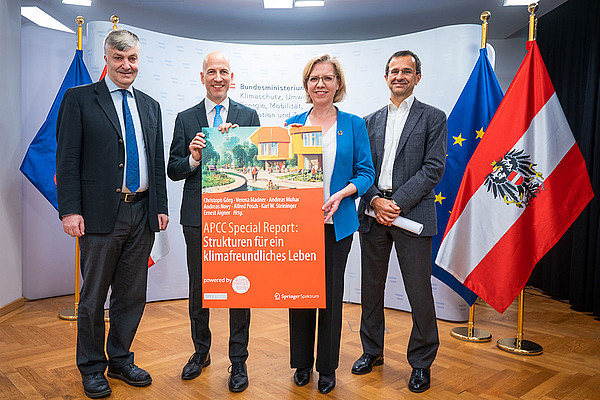Klimafreundliches Leben braucht geeignete Strukturen, und die sind in Österreich derzeit nur unzureichend vorhanden. Diese Bilanz zieht der neue, 700 Seiten starke Special Report des Austrian Panel of Climate Change (APCC). Am 28. November 2022 wurde er von den Mitherausgebern Karl Steininger (Universität Graz) und Andreas Novy (Wirtschaftsuniversität Wien) präsentiert und an Klimaschutzministerin Leonore Gewessler und Arbeitsminister Martin Kocher übergeben.
Für die Autor:innen ist klar: Menschen nur zu klimabewusstem Handeln aufzufordern, ist weder ausreichend noch zielführend. Denn fehlen die entsprechenden Rahmenbedingungen, ist es für Bürger:innen schwer, im Alltag nachhaltig zu agieren. Damit klimafreundliches Leben attraktiv, dauerhaft möglich und auch selbstverständlich wird, braucht es weitreichende strukturelle Veränderungen in allen Lebensbereichen, von Wohnen und Mobilität über die Ernährung bis hin zu Freizeitgestaltung und Arbeit. Und dazu seien alle gesellschaftlichen Kräfte gefordert.
„Ohne kritische wissenschaftliche Analyse, ohne Unternehmen, die sich für klimafreundliches Leben einsetzen, und ohne an Allgemeinwohl und klimafreundlichem Leben orientierte Interessenvertretungen und Politik sind die notwendigen Transformationen kaum umsetzbar“, sagt Karl Steininger vom Wegener Center der Uni Graz. „Entscheidend wird sein, in den kommenden Jahren Strukturen sehr schnell umzugestalten, damit die Klimaziele noch erreicht werden können, dabei aber stets den sozialen Zusammenhalt und die Klimagerechtigkeit im Auge zu behalten“, ergänzt Alfred Posch vom Institut für Systemwissenschaften, Innovations- und Nachhaltigkeitsforschung. Mit Steininger und Posch sind zwei der insgesamt sieben Mit-Herausgeber:innen des APCC Special Report Experten der Universität Graz.
Der vom Klima- und Energiefonds in Auftrag gegebene Bericht mit dem Titel „Strukturen für ein klimafreundliches Leben“ – dotiert aus Mitteln des Klimaschutzministeriums – wurde von mehr als 80 renommierten Wissenschaftler:innen aus unterschiedlichen Disziplinen erstellt, von mehr als 180 Expert:innen begutachtet und von einem Dialog mit Stakeholdern aus Gesellschaft und Politik begleitet.
>> Aussendung des Bundesministeriums für Klimaschutz
>> zum Bericht

